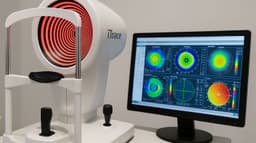
Laser Eye Surgery Safety: The Inside Story On The World's Most Popular Elective Surgery
You’re so close to deciding that you DO want to have laser eye surgery but, you’re wondering how safe it is. The idea of surgery can be daunting and the internet doesn’t always help. Well, we’re here to help put your mind at ease.
Laser eye surgery is one of the safest procedures in the world. It is quick, painless and recovery is very quick. Both eyes can be operated on at the same time and most forms of short-sightedness can be corrected. Surgery is becoming the first choice for those who want to get rid of their glasses and/or contacts.
Like with any kind of surgery, there are some risks. Yet, the likelihood of these risks occurring is very low. When side effects do occur, you can trust your surgeon to provide a solution to help fix what has occurred. Possible side effects include:
- Temporary visual disturbances during the first few days of recovery
- Light sensitivity
- Halos/glares especially when driving at night
- Dry eyes
All these side effects are not permanent and can be treated. If you do experience these side effects, you can expect them to disappear within a few months. Yet, most people will experience some discomfort in the first 12 hours.
To avoid these risks, it’s best to opt for a surgeon who has extensive experience and is a skilled laser eye surgeon. This will allow you to achieve the best visual outcome possible. All laser eye surgeons are required to be qualified and registered with the General Medical Council.
Top 10 Safety Features While Performing Laser Eye Surgery
Laser eye surgery is a sophisticated medical procedure that involves reshaping the cornea to correct vision problems. Ensuring patient safety is of utmost importance during these procedures. Here are 10 essential safety features and measures that are typically observed when performing laser eye surgery:
- Thorough Preoperative Assessment: Before the surgery, a comprehensive eye examination is conducted to evaluate the patient's overall eye health, refractive error, corneal thickness, and other relevant factors.
- Qualified Surgeon: The procedure is performed by a qualified ophthalmologist who specialises in refractive surgery. Their expertise and experience are critical to ensuring the safety and success of the surgery.
- Customised Treatment Plan: Each patient's eye is unique, and a customised treatment plan is developed based on precise measurements and diagnostic data, ensuring accuracy in correction.
- Advanced Technology: The surgery is performed using state-of-the-art laser technology, which offers greater precision, accuracy, and safety compared to traditional methods.
- Intraoperative Monitoring: Real-time monitoring and tracking systems are used to ensure the laser is precisely aligned and targeted on the cornea throughout the procedure.
- Anaesthetic Eye Drops: Numbing eye drops are applied to ensure the patient's comfort during the surgery. These drops also help prevent discomfort or pain.
- Flap Creation (If Applicable): If using a procedure like LASIK that involves creating a corneal flap, advanced femtosecond laser technology is employed, which enhances safety and accuracy.
- Infection Control Measures: A sterile environment is maintained throughout the surgery to prevent the risk of infection.
- Patient Communication: Surgeons communicate with patients during the procedure, ensuring their comfort and providing reassurance throughout the process.
- Postoperative Care: After the surgery, patients are provided with clear postoperative care instructions. Follow-up appointments are scheduled to monitor healing and address any concerns.
Using A Professional Eye Surgeon
Our surgeon, Mr John Bolger, is registered with the General Medical Council and is also a member of The Royal College of Ophthalmologists, The Royal College of Surgeons plus more.
He has completed courses such as the Refractive Laser module at the University of Ulster in 2017 and has plans to attend more so that he is always up to date with the latest techniques and finding out about the latest technology. This ensures that the practice of safe and successful treatment is given each time.
Another indicator of a clinic’s quality and safety is the type of equipment they use. We use the Visumax MEL 90, supplied by Carl Zeiss, providers of the latest and most modern equipment available. The newer the equipment, the less chance there is of error, leaving you in safe hands at our clinic.
You can find out more information on the quality of Mr Bolger's service from our previous patients on TrustPilot where we are currently ranked 9.1/10!
Candidacy
To have surgery, there is an extensive testing process to determine whether you are suitable. If you’re not, surgery can't be planned for safety reasons. Some of the reasons you may not be suitable are:
- Your corneas are too thin or irregular (this is important because the laser thins your cornea)
- Your prescription is not stable (your prescription has to be stable for at least two years)
- You have a high refractive error
- You have an eye disorder(s) such as Keratoconus or dry eyes
- Your general health is not good e.g. you are diabetic
- You are under the age of 20 (this is because your prescription is most likely still changing)
- You are pregnant
These factors are considered when determining whether you are suitable for laser eye surgery to avoid the risk of damage. If you are not suitable, we will be more than happy to find alternate solutions for you.
Success Rate
It’s rare for a patient to not get 20/20 vision or even better. But, if this occurs, your surgeon will ensure that they provide the correct treatment to rectify it.
You will be given a consent form to sign to confirm that you understand what the procedure involves and how your recovery process will plan out.
You will need to make sure you are 100% happy with the whole process and that all your questions have been answered.
A consultation with our surgeon, Mr John Bolger, lasts approximately 2 hours giving you plenty of time to ask as many questions as you like.
Find out more by Speaking to our team









